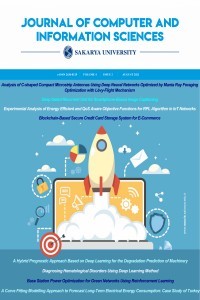Osteoporoz Ön Tanısının Olasılıksal Sinir Ağları (OSA) Yardımıyla Gerçekleştirilmesi
Osteoporozun Tanısı, Olasılıksal Sinir Ağları, Karar Destek Sistemleri
Pre-Diagnosis of Osteoporosis Using Probabilistic Neural Networks
___
- Alkan BM, Fidan F, Tosun A, Ardıçoğlu Ö. 2011. “Fiziksel Tıp ve rehabilitasyon polikliniğimize başvuran hastalarda osteoporoz insidansı”. Türk Osteoporoz Dergisi. vol-17:10-3.
- Aslan A, Karakoyun Ö, Güler E, Aydın S, Gök MV, Akkurt S. 2012. “Evaluation of bone mineral density, osteoporosis prevalence and regional risk factors in Turkish women living in Kastamonu: KASTÜRKOS study”. Eklem Hastalık Cerrahisi, vol-23(2):62-67.
- Baim S, Binkley N, Bilezikian JP, Kendler DL, Hans DB, Lewiecki EM, et al. 2008. “Official Positions of the International Society for Clinical Densitometry and executive summary of the 2007 ISCD Position Development Conference”. J Clin Densitom; vol-11:75-91.
- Boonen S, Vanderschueren D, Cheng XG, et al. 1997. “Age-related (type II) femoral neck osteoporosis in men: biochemical evidence for both hypovitaminosis D- and androgen deficiency-induced bone resorption”. J Bone Miner Res; vol-12:2119-26.
- Çelik O, Salcı Y, Manisalı M, Korkusuz F. 2009. “The effect of hip rotation on bone mineral density of the proximal femur measured by dual energy X-ray absorptiometry”. Eklem Hastalik Cerrahisi; vol-20:71-7.
- Delen D, Walker G, Kadam A. 2005. “Predicting breast cancer survivability: A comparison of three data mining methods”, Artificial Intelligence in Medicine, Vol.34, No.2,113-127.
- Er O, Sertkaya C, Temurtas F, Tanrikulu AC. 2009. “A comparative study on chronic obstructive pulmonary and pneumonia diseases diagnosis using neural networks and artificial immune system”, Journal of Medical Systems, Vol.33, No.66, 485-492.
- Er O, Tanrikulu AC, Abakay A. 2015. “Use of artificial intelligence techniques for diagnosis of malignant pleural mesothelioma”. Dic Med J, vol-42(1), 5–11.
- Gul O, Atik OS, Erdogan D, Goktas G. 2012. “Is bone microstructure different between osteopenic and osteoporotic patients with femoral neck fracture?”. [Article in Turkish] Eklem Hastalik Cerrahisi. Vol-23:15-9.
- Gulbag A, Temurtas F, Yusubov I. 2007. “Quantitative discrimination of the binary gas mixtures using a combinational structure of the probabilistic and multilayer neural networks”, Sens. Actuators B: Chem., Vol.131, 196-204.
- Pınar G, Pınar T, Doğan N, Karahan A, Algıer L, Abbasoğlu A, Kuşcu E. 2009. “Osteoporosis risk factors in the women over 45-years old”. Dicle Tıp Derg / Dicle Med J Cilt/Vol 36, No 4, 258-266.
- Specht DF. 1990. “Probabilistic neural networks”, Neural Networks, Vol.3, 109–118.
- Temurtas F. 2009. “A comparative study on thyroid disease diagnosis using neural networks”, Expert Systems with Applications, Vol.36, No.1, 944–949.
- World Health Organization Study Group: “Assessment of fracture risk and its application to screening for postmenopausal osteoporosis”. World Health Organ Tech Rep Ser 1994;843:1-129.
- Yayın Aralığı: Yılda 3 Sayı
- Başlangıç: 2018
- Yayıncı: Sakarya Üniversitesi
Osteoporoz Ön Tanısının Olasılıksal Sinir Ağları (OSA) Yardımıyla Gerçekleştirilmesi
Adem DALCALI, Onursal ÇETİN, Cemil OCAK, Feyzullah TEMURTAŞ
Lazer İşaretleri İle Otomatik Hedef Tanıma
Nevzat OLGUN, İbrahim TÜRKOĞLU
Mustafa ÖZCAN, Mehmet YILDIRIM
A New Solution Approach for Non-Linear Equation Systems with Grey Wolf Optimizer
